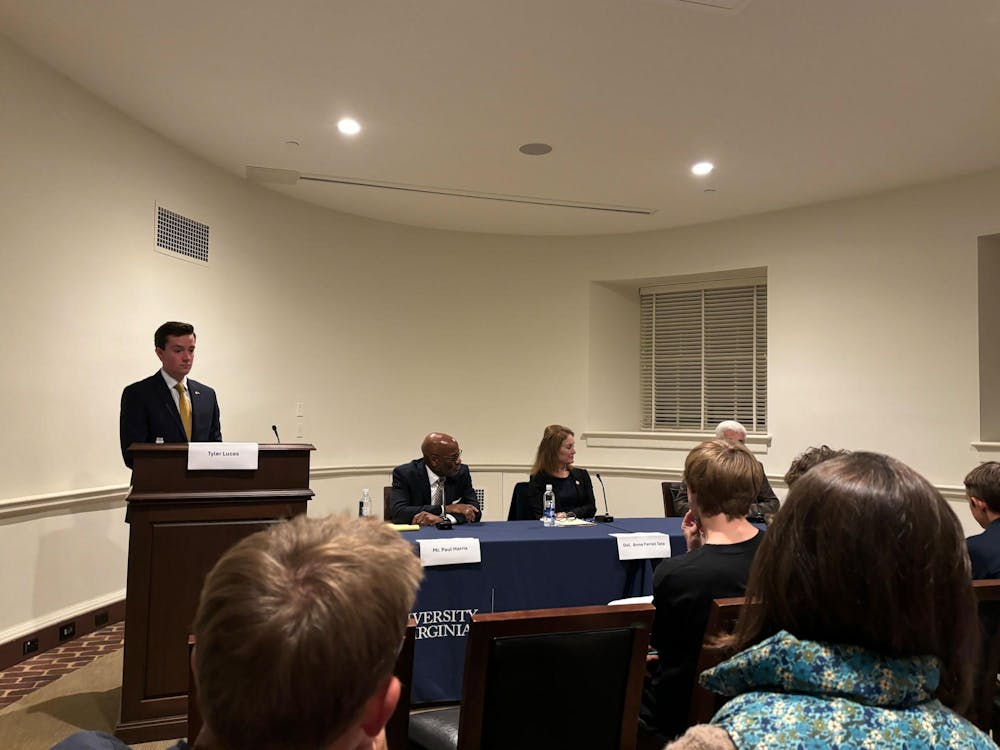The Center for Politics co-sponsored a panel titled “Your Vote is your Voice” alongside the University Chapter of Young Americans for Freedom, a student group that provides a space for conservative students to find a like-minded community. Tyler Lucas, YAF chairman and fourth-year College student, moderated Thursday’s event, facilitating the discussion with a panel of former and current republican legislators.
Under the overarching goal to mobilize students to vote — no matter their party affiliation — the panel discussed campaign experiences and the importance of cross-partisan collaboration in driving meaningful change.
Panelists included State Delegates Anne Ferrell Tata (R-Virginia Beach), David Owen (R-Henrico) and the Honorable Paul Harris, former Republican delegate for Albemarle County and current member of the University's Board of Visitors. Though all panelists were elected officials from the Republican party, the event maintained a focus on bridging the partisan divide.
The panel first discussed the importance of voting and misconceptions about its effectiveness that citizens each only receive one vote and might not feel as if their ballot matters. Harris emphasized the importance of being an active voter, stating that people are the foundation of the government and have the responsibility to engage with their government through voting.
“The government derives its power from the people, and when we forget that, we lose sight of an essential core part of our … system of government,” Harris said. “We often forget that in our system of government, we have rights … we have privileges, but we also as citizens have responsibilities. Voting is one of those.”
Panelists also cited the tight margins that often determine the local elections as further reason to vote, with races sometimes coming down to a small number of votes. Tata mentioned three or four recent local races she knew of that came down to just hundreds of votes, saying that because of these margins, every vote matters.
Tata specifically said that she is disappointed to see low voter turnouts in her district and for presidential races, stating that citizens should take advantage of the ability to voice their opinions in elections.
“When I look back year after year, even in presidential races, less than 50 percent of the population votes. I just find that staggering,” Tata said. “I think this is such a gift, this government … and we have to steward this gift. And the only way we can do that is to get out and vote.”
Lucas said that many people cite the difficulty of keeping up with election dates as a reason not to vote. Virginia, for example, is one of few states to have elections every year for major offices such as state legislators, congress, senate, governor and president.
Owen responded by emphasizing just how much impact these local elections that roll around year after year have on citizens’ daily lives.
“That [presidential] vote has less impact on your day-to-day life than when you vote for all [the] local offices,” Owen said. “You think voting for the presidential election does your civic duty, [but] that’s just a small piece of it. Voting in local elections and state elections has more influence and impact on day-to-day life.”
All three panelists, however, discussed the evolving space of campaigning as a source of excitement and innovation in politics. The panelists noted the creative ways in which today’s national political candidates campaign to sway voters, including a recent instance of Republican presidential candidate Donald Trump appearing at a Pennsylvania McDonald’s, helping to serve french fries.
“I think campaigns are increasingly becoming more and more creative in the way that they seek to reach voters … momentum and energy is so important to the campaign,” Harris said. “Trump in McDonald’s … it works for him.”
Owen, however, said he was not confident about whether the candidates were being pointed in their approaches, or rather trying many different forms of campaigning and outreach in hopes that some tactics will prove fruitful.
“You don’t know what’s going to work, so you just keep doing everything you can to engage voters,” Owen said. “When you run a local race, going out and talking to people, knocking on doors, is a way to connect. In a national race, you can’t do that.”
The panel concluded with a Q&A session, addressing topics like the importance of building relationships with delegates from opposing parties and the modest compensation legislators receive, highlighting the role as one driven purely by service to the community.
Third-year College student Lena Jovancevic said she attended the panel to hear some moderate Republican voices speak on the importance of voting. She said that while she identifies as a Democrat, she came with intentions of listening to an alternate viewpoint.
“I was happy to hear about a couple bills they spoke about supporting that seemed very bipartisan and rational and that I agreed with, despite being a Democrat,” Jocancevic said.
Third-year College student Sophia Bangura shared a similar sentiment, saying she appreciated hearing about how each of the legislators navigated partisan division to get laws passed they believed superseded party lines.
“It was really interesting to understand some of the struggles they face in getting work done, but also how eager they are to be bipartisan — it was very comforting,” Bangura said.
As Nov. 5 approaches, students are continuing to cast their ballots. Owen said that it is important for students to remain involved in the election by whatever means they could and that above all they should vote, regardless of party affiliation.
“If you want to be able to voice your opinion and complain about things you need to vote,” Owen said. “Whether you vote for my side or the other side, I don't care, but please get out and vote.”







